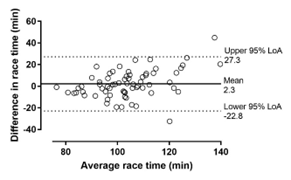Predictors of half-marathon performance in male recreational athletes
DOI:
https://doi.org/10.17179/excli2023-6198Keywords:
body fat, endurance, ergometry, long-distance running, performance groupAbstract
Few research has been conducted on predictors of recreational runners’ performance, especially in half-marathon running. The purpose of our study was (a) to investigate the relationship of half-marathon race time with training, anthropometry and physiological characteristics, and (b) to develop a formula to predict half-marathon race time in male recreational runners. Recreational runners (n=134, age 44.2±8.7 years; half-marathon race time 104.6±16.2 min) underwent a physical fitness battery consisting of anthropometric and physiological tests. The participants were classified into five performance groups (fast, 73-92 min; above average, 93-99 min; average 100-107 min; below average, 108-117 min; slow group, 118-160 min). A prediction equation was developed in an experimental group (EXP, n=67), validated in a control group (CON, n=67) and prediction bias was estimated with 95 % confidence intervals (CI). Performance groups differed in half-marathon race time, training days, training distance, age, weight, (body mass index) BMI, body fat (BF) and maximum oxygen uptake (VO2max) (p≤0.001, η2≥0.132), where faster groups had better scores than the slower groups. Half-marathon race time correlated with physiological, anthropometric and training characteristics, with the faster the runner, the better the score in these characteristics (e.g., VO2max, r=0.59; BMI, r=-0.55; weekly running distance, r=-0.53, p<0.001). Race time in EXP might be calculated (R2=0.63, standard error of the estimate=9.9) using the equation ‘Race time (min)=80.056+2.498×BMI-0.594×VO2max-0.191×weekly training distance in km’. Validating this formula in CON, no bias was shown (difference between observed and predicted value 2.3±12.8 min, 95 % CI -0.9, 5.4, p=0.153). Half-marathon race time was related to and could be predicted by BMI, VO2max and weekly running distance. Based on these relationships, a prediction formula for race time was developed providing a practical tool for recreational runners and professionals working with them.

Downloads
Additional Files
Published
How to Cite
License
Copyright (c) 2023 Pantelis T. Nikolaidis, Beat Knechtle

This work is licensed under a Creative Commons Attribution 4.0 International License.
Authors who publish in this journal agree to the following terms:
- The authors keep the copyright and grant the journal the right of first publication under the terms of the Creative Commons Attribution license, CC BY 4.0. This licencse permits unrestricted use, distribution and reproduction in any medium, provided that the original work is properly cited.
- The use of general descriptive names, trade names, trademarks, and so forth in this publication, even if not specifically identified, does not imply that these names are not protected by the relevant laws and regulations.
- Because the advice and information in this journal are believed to be true and accurate at the time of publication, neither the authors, the editors, nor the publisher accept any legal responsibility for any errors or omissions presented in the publication. The publisher makes no guarantee, express or implied, with respect to the material contained herein.
- The authors can enter into additional contracts for the non-exclusive distribution of the journal's published version by citing the initial publication in this journal (e.g. publishing in an institutional repository or in a book).





